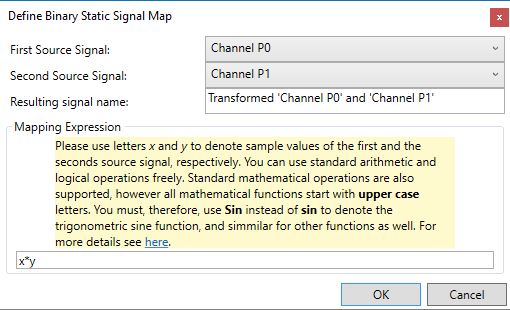Adding Binary Static Signal Mappings¶
A binary static signal mapping is a point-wise transformation of two signal into a single resulting one. Probably the best known and most widely used static binary transformation of signals is multiplication, where each sample of the resulting signal is obtained by multiplication of the corresponding samples of the source signals. This is the default binary transformation in PowerDesk, but any mathematically valid transform can be used as well.
Note also that any combination of point-wise mapping is itslef a pointwise transform.
To create a binary static signal map in Perun PowerDesk, simply choose Add Binary Static Signal Mapping … option from the Main Window Ribbon Menu. The following dialog appears

The Define Binary Static Signal Map dialog.¶
The dialog allows for defining source signals, the name of the resulting transformed signal, and the expression used to transform source signals. Symbols x and y are used in the expression to denote values of the first and the second source signal, respectively. For more details regarding expression syntax see Expression Syntax.
It is important to stress that the two source signals must be compatible in order for them to produce a valid binary statis mapping. Compatible signals have the same initial time, the same sampling rate and the same length. If any of these values are different in one source signal compared to the other, the mapping will be considered invalid. When invalid mapping is encountered, the resulting signal is filled with NaN values. These values are not displayed in scopes.
